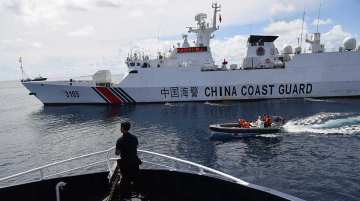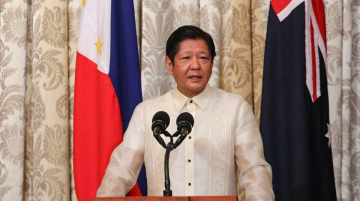
Last week’s violent confrontation between Chinese and Filipino maritime authorities in the South China Sea triggered a furious response in Chinese domestic media, both from official outlets and from legions of angry netizens on social media platforms.
The vast majority of the discourse lacks any meaningful nuance and instead channels a palpable sense of grievance that a small, weak country like the Philippines would have the audacity to challenge the universally accepted norm (in China) that every inch of territory within China’s ten-dash line is settled history and certainly not up for negotiation.
The vast majority of this conversation is happening on social platforms like WeChat and Weibo, where four themes have emerged as the prevailing narratives:
- BRAVADO: The message from the Foreign Ministry is that China will “take all measures” to protect its interests in the South China Sea. Online media is following the lead and amping it up with lots of rhetoric about how the powerful Chinese Navy will “deal with the Philippines.”
- RIGHTEOUSNESS: The Chinese government consistently claims its interventions in the South China Sea are “in accordance with the law” (of course, they’re referencing Chinese law rather than international law). This leads to a sense of moral righteousness in the online discourse that whatever the Chinese are doing in response to challenges by the Philippines and others must be correct because, well, it’s the law.
- CONSPIRACY: Everyone in the discourse is 100% certain it is the U.S., not the Philippines, that is ultimately to blame for this crisis. They are convinced that Washington is using President Marcos as a pawn to pressure China. This narrative is also intertwined with the story about the so-called “gentleman’s agreement” that China purportedly had with Marcos’ predecessor, Rodrigo Duterte, who was considerably more pro-China.
- ARROGANCE: Nowhere in the discussion is there ever any consideration that the Philippines or other rival claimants, have any agency in this dispute. There’s a very strong sense of entitlement that borders on arrogance among online commentators who largely frame the world through the lens of great power competition where the U.S., Europe, or in some cases, Japan serves as a sort of “black hand” anytime China’s interests are challenged, like what’s happening now in the South China Sea.
WHY IS THIS IMPORTANT? This hyper-polarized, nationalistic media narrative that now dominates the discourse about the South China Sea is by no means exceptional for a major power like China. U.S. and European media tend to be equally provincial in their coverage of these topics as well.
What’s clear, though, is that there’s no appetite whatsoever in China for anything that resembles compromise or even the slightest concession. Even in China’s tightly regulated media ecosystem, that would not be easy to manage.
SUGGESTED READING:
- Knews: Philippines’ South China Sea farce escalates: Don’t take China’s restraint as an opportunity (in Chinese)
- Shanghai Observer: Is it an exaggeration to describe the Philippines’ actions in the South China Sea as a “clown”? (in Chinese)






